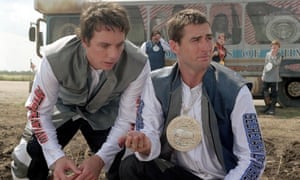How a disastrous change in perspective disempowered the left and let the right rise
In August 2001, the radical writer and film-maker Michael Moore presented HarperCollins with the manuscript later known as Stupid White Men. It was still being edited when the September 11 attack occurred. In the newly hyper-patriotic environment, the publisher baulked at releasing a book ridiculing George W Bush and the Republican administration, with chapters entitled Kill Whitey! and A Very American Coup.
Moore was instructed to revise substantially a work that would, HarperCollins decreed, appear under the more palatable title Michael Moore: the American. That extraordinary editorial intervention, which ostensibly came directly from Rupert Murdoch himself, attracted the attention of a group of librarians. The outraged book-lovers publicised Moore’s predicament with sufficient vigour to ensure the text’s release in its original form.
On the first day of its release, Stupid White Men sold all 50,000 copies of its print run – and by its fifth day was on its ninth printing. Quickly, it became a defining statement of opposition to the Bush administration in the early phases of the “war on terror”.
Moore had grown up in the union town of Flint, Michigan, and in many respects his book was an excoriation of the new administration for its cruel indifference to blue-collar Americans. But his title also reflected, as the anti-corporate global justice movement with which he’d been associated disintegrated, the new hegemony of what we might call “smug politics”.
Stupid White Men echoed a conviction common among progressives as soon as George W Bush took power: namely, the man was an idiot. It was not an unreasonable suggestion. President Bush possessed, for instance, an extraordinary ability to mangle the English language.
“Our nation must come together to unite,” he explained at one point. “Is our children learning?” he said on another occasion.
“Families,” Bush said, during a third speech, “is where our nation finds hope, where wings take dream.”

Michael Moore’s 2001 book Stupid White Men was smug politics at its most overt. Photograph: Matt Baron/REX/Shutterstock
In 2003, the journalist Frank Bruni explained that “the Bush I knew was part scamp and part bumbler, a timeless fraternity boy and heedless cutup, a weekday gym rat and weekend napster”. The president apparently loved fart jokes, and would let rip in front of new aides, confident that intentional flatulence helped the fresh appointees to settle in. When he received news of the September 11 terror attacks, Bush didn’t, at first, react – video footage that featured heavily in a subsequent Moore documentary showed him placidly continuing to read to schoolchildren from a book entitled The Pet Goat, as if he couldn’t grasp the magnitude of the catastrophe.
Considerable evidence could thus be adduced for the Bush-was-a-moron theory.
But what followed politically? If Bush was the stupidest of the stupid white men, how had he come to power? Who had voted for him? Most of all, why weren’t ordinary people rising up against the dangerous buffoon who ruled them?
Moore’s book drew a simple conclusion. “[I]f you live in a country,” he wrote, “where 44 million can’t read – and perhaps close to another 200 million can read but usually don’t – well, friends, you and I are living in one very scary place.” The moron president remained in power because the American people were themselves moronic. Stupid White Men described Bush as the “idiot leader of an idiot nation”, and explained that “it comes as no surprise to foreigners that Americans, who love to revel in their stupidity, would ‘elect’ a president who rarely reads anything – including his own briefing papers”.
This was smug politics at its most overt, not just in the assessment of Americans as people “who love to revel in their stupidity”, but in its implication that the reader (“you and I”) was, like Moore himself, smarter than the ordinary dopes whom the book discussed.
These formulations simply inverted the culture-war themes of the right. The Republican electoral campaign had, after all, contrasted George W Bush’s folksiness with the supposed superciliousness of his opponent, Al Gore.
The September 11 atrocity and the outbreak of the “war on terror” facilitated the Republican efforts to build on this image. Bush became a war president – but a war president of a special type. His minders cast him as John Wayne: a hero, to be sure, but also an everyman, whose greatness distilled the values of the heartland.

When George W Bush became ‘war’ president, he was paraded in airforce regalia to declare victory in Iraq. Photograph: Kevin Lamarque/REUTERS
When Bush (who’d enlisted as a fighter pilot in Texas to evade the Vietnam War) arrived on an aircraft carrier in a flying suit to declare victory in Iraq, the NBC pundit Chris Matthews hosted Watergate felon Gordon Liddy to discuss his appearance.
“You know, he’s in his flight suit,” said Liddy. “He’s striding across the deck, and he’s wearing his parachute harness … and it makes the best of his manly characteristic. … He has just won every woman’s vote in the United States of America. You know, all those women who say size doesn’t count – they’re all liars.”
This grotesque exchange (and many others like it) provided credence to Moore’s assessment of American idiocy. Here was a political culture at rock bottom, with sycophantic journalists enthusing about how the president, unlike his effete opponents, possessed a large penis.
Yet Moore’s argument that the people themselves were responsible for Bush’s antics implicitly reinforced the Republican case. The right equated the president with the American electorate, and distinguished them both from sneering elitists. Moore did exactly the same – except with the polarities reversed. Conservatives insisted the people and their leaders were wise; Moore judged them both moronic.
The first position was, for obvious reasons, far more politically successful than the second.
The decline of the traditional leftwing infrastructure – parties, organisations, NGOs and the like – that previously might have given progressives a platform meant that leftwing or liberal celebrities took on an especial cultural significance during the Bush years. For many people on the left – especially as the internet became mainstream – politics became a matter of applauding or sharing an intervention by one or another progressive public figure. To cater to this need, a particular style of humour developed, associated with Stephen Colbert, Jon Stewart and similar figure. Throughout the Bush years, progressives kept up their morale by blogging about the latest sketch in which Stewart cut some Fox News blowhard or another down to size.
Yet such victories were always pyrrhic, since the ever-present snark of smug politics affirmed the right’s new-class theory even as it mocked it.
The academic Jay Rosen identified something he called “the cult of savviness” within professionalism journalism. By savviness, he meant the quality of being knowing, ironic, perceptive, shrewd and unsentimental. “Savviness is what journalists admire in others,” Rosen wrote. “Savvy is what they themselves dearly wish to be. (And to be unsavvy is far worse than being wrong.)”

The new mode of smug politics was perfectly represented by the 2006 movie Idiocracy. Photograph: REX/c.20thC.Fox/Everett
The smug politics of the Bush era depended on the progressive embrace of savviness. The Daily Show–style gags only worked for a savvy crowd. Such jokes weren’t intended to convince anyone. In fact, almost by their nature, they couldn’t convince anyone. To get the sketch – which often consisted of little more than a clip of a conservative saying something stupid, followed by the liberal host mugging to the camera in mock amazement – the audience needed to already know and already accept the correct position.
The new mode of smug politics was perfectly represented in the 2006 movie Idiocracy, a satire that presented the United States of the future as a dystopia dominated by overweight morons who spent their lives masturbating, eating junk food and watching programs like Ow! My Balls! The film outlined its set-up by explaining that American society had reversed evolution, allowing the foolish to breed while the intelligent remained childless. As a result, progressive and enlightened individuals were swamped by the backwardness of the great unwashed.
Liberals may not have said openly that they regarded ordinary people as so stupid that their procreation threatened civilisation itself. Yet as a satire, Idiocracy spelled out the deep elitism embedded in the prevailing critique of conservatism.
The consolatory power of the “idiot nation” trope was obvious. If voters were slack-jawed rubes, well, it couldn’t be the fault of progressives that protests were small or that leftwing ideas lacked purchase. Activists committed to smug politics could take comfort knowing that the masses were too dumb to grasp the cogent arguments being presented to them.
But, politically, such rhetoric was disastrous. By dismissing the people as fools, progressives confirmed everything the culture warriors said: they openly embraced the condescending stereotype of the liberal elitist.
Political analyst Thomas Frank made the point that, despite the new-class presentation of progressives as elites, most leftists and liberals were not, and had never been, wealthy or powerful. Nevertheless, Frank argued, the increasing reliance on celebrities and the media meant that many ordinary people encountered progressive ideas in, say, magazine articles, where, as he put it, “singers who were big in the 70s express their concern with neatly folded ribbons for this set of victims or that”. In such settings, progressive causes seemed “a matter of shallow appearances, of fatuous self-righteousness … a politics in which the beautiful and the wellborn tell the unwashed and the beaten down how they should stop being racist or homophobic, how they should be better people”.
Throughout the 60s and the early 70s, most progressive activists had seen “the people” (however that term was defined) as the solution to a sexist, racist oppression associated with the wealthy and the powerful. Increasingly, though, many progressives identified the masses not as the answer but as the problem, a foolish and slightly terrifying reservoir of cultural and political backwardness. This disastrous perspective – an implicit confirmation of the case being made by conservative culture warriors – would play an important role in the right’s ongoing successes.
This is an edited extract from Trigger Warnings: Political Correctness and the Rise of the Right by Jeff Sparrow, published by Scribe on 1 October.
Source: https://www.theguardian.com/us-news/2018/oct/01/how-a-disastrous-change-in-perspective-disempowered-the-left-and-let-the-right-rise
Comments
Post a Comment